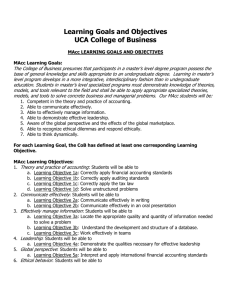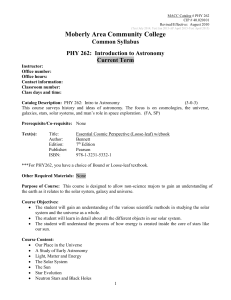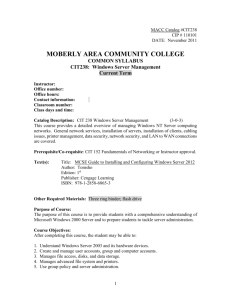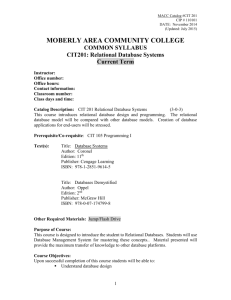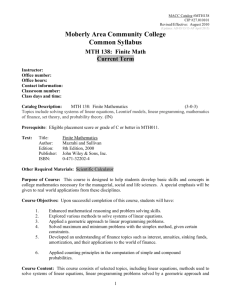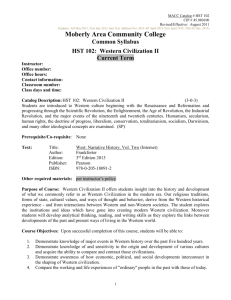PSY 201 Child Growth and Development
advertisement
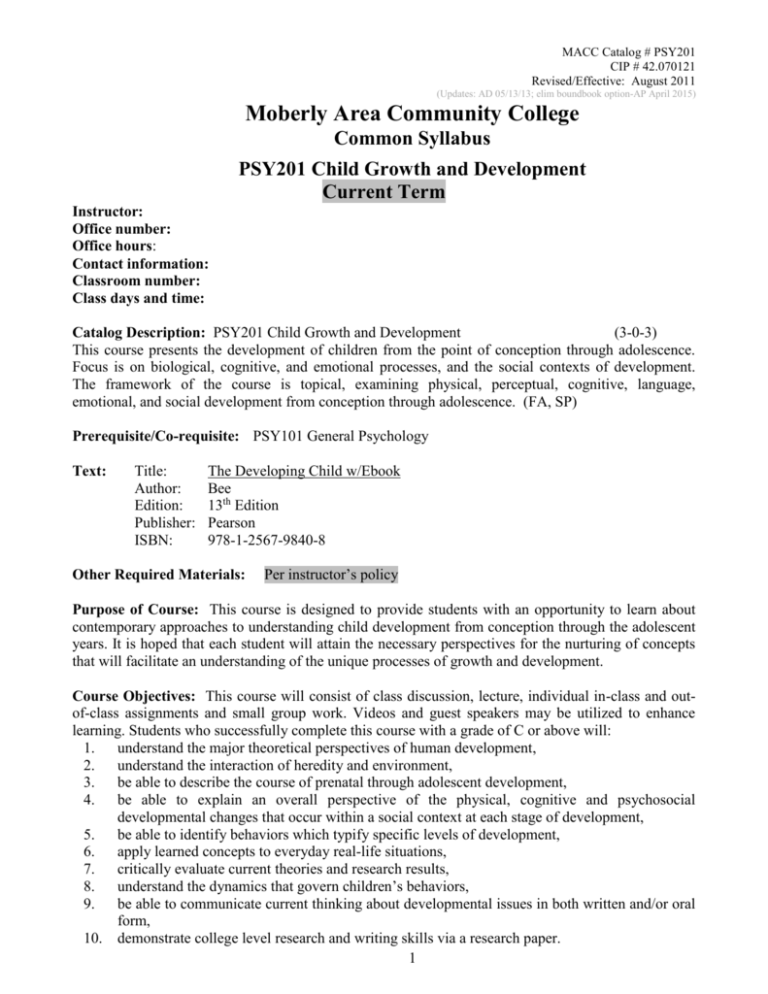
MACC Catalog # PSY201 CIP # 42.070121 Revised/Effective: August 2011 (Updates: AD 05/13/13; elim boundbook option-AP April 2015) Moberly Area Community College Common Syllabus PSY201 Child Growth and Development Current Term Instructor: Office number: Office hours: Contact information: Classroom number: Class days and time: Catalog Description: PSY201 Child Growth and Development (3-0-3) This course presents the development of children from the point of conception through adolescence. Focus is on biological, cognitive, and emotional processes, and the social contexts of development. The framework of the course is topical, examining physical, perceptual, cognitive, language, emotional, and social development from conception through adolescence. (FA, SP) Prerequisite/Co-requisite: PSY101 General Psychology Text: Title: Author: Edition: Publisher: ISBN: The Developing Child w/Ebook Bee 13th Edition Pearson 978-1-2567-9840-8 Other Required Materials: Per instructor’s policy Purpose of Course: This course is designed to provide students with an opportunity to learn about contemporary approaches to understanding child development from conception through the adolescent years. It is hoped that each student will attain the necessary perspectives for the nurturing of concepts that will facilitate an understanding of the unique processes of growth and development. Course Objectives: This course will consist of class discussion, lecture, individual in-class and outof-class assignments and small group work. Videos and guest speakers may be utilized to enhance learning. Students who successfully complete this course with a grade of C or above will: 1. understand the major theoretical perspectives of human development, 2. understand the interaction of heredity and environment, 3. be able to describe the course of prenatal through adolescent development, 4. be able to explain an overall perspective of the physical, cognitive and psychosocial developmental changes that occur within a social context at each stage of development, 5. be able to identify behaviors which typify specific levels of development, 6. apply learned concepts to everyday real-life situations, 7. critically evaluate current theories and research results, 8. understand the dynamics that govern children’s behaviors, 9. be able to communicate current thinking about developmental issues in both written and/or oral form, 10. demonstrate college level research and writing skills via a research paper. 1 MACC Catalog # PSY201 CIP # 42.070121 Revised/Effective: August 2011 (Updates: AD 05/13/13; elim boundbook option-AP April 2015) Course Content: I. The nature of child development A. Modern study of child development B. Social policy and children’s development C. Biological, cognitive, and socioemotional processes D. Periods of development II. Theories and the Scientific Method A. Psychoanalytic theories B. Cognitive theories C. Behavioral and social learning theories D. Ethological theories E. Ecological, contextual theories F. Developmental analogies III. Biological Beginnings A. The evolutionary perspective 1. Natural selection and adaptive behavior 2. Sociobiology 3. Evolutionary Psychology B. Heredity C. Genetic principles and methods 1. Methods used by Behavior geneticists 2. Heredity’s influence on development D. Heredity-environment interaction and children’s development 1. Genotype and environmental concepts 2. Shared and non-shared environmental influences 3. The contemporary heredity-environment controversy IV. Prenatal Development and Birth A. The course of prenatal development B. Birth C. Postpartum V. Physical, Motor, and Perceptual Development in Infancy A. Physical growth and development 1. Cephalocaudal and proximodistal sequences 2. Nutrition B. The brain C. Motor development D. Sensory and Perceptual development 1. Theories of perceptual development 2. Intermodal perception VI. Physical Development in Childhood and Puberty VII. Cognitive Development and Piaget’s Theory A. Cognitive Developmental Theory and processes B. Piaget’s stages of cognitive development C. Vygotsky’s Theory of Cognitive Development VIII. Information Processing A. Memory B. Conceptual Development C. Problem solving 2 MACC Catalog # PSY201 CIP # 42.070121 Revised/Effective: August 2011 (Updates: AD 05/13/13; elim boundbook option-AP April 2015) IX. X. XI. XII. XIII. XIV. D. Academic skills Intelligence A. The nature of intelligence and its measurement B. Infant intelligence and the stability of intelligence C. Controversies and issues 1. The heredity-environment controversy 2. Culture and ethnicity 3. The use and misuse of intelligence tests 4. Comparison of approaches to children’s learning, cognitive development and intelligence D. The extremes of intelligence and creativity Language Development A. Language’s rule systems B. Language’s Biological and Sociocultural/Environmental Heritages C. The role of cognition in language D. How language develops Attachment, Temperament, Emotional Development A. The nature of children’s emotions B. Emotional development in infancy C. The new functionalism in emotion D. Children’s depression and depressed parents E. Depression in adolescence F. Temperament G. Attachment 1. Individual differences 2. Care giving styles and attachment development 3. Measurement of attachment The Self and Identity A. Self-understanding and self esteem B. Identity 1. Erickson’s ideas on identity 2. Some contemporary thoughts on identity 3. The four statuses of identity 4. Developmental changes 5. Family influences on identity 6. Cultural and ethnic aspects of identity 7. Gender and identity development Gender A. Biological, social, and cognitive influences on gender B. Gender stereotypes, similarities and differences C. Gender role classification D. Developmental windows of gender opportunity and asymmetric gender socialization E. Women’s and men’s issues F. Ethnicity and gender Moral Development A. Piaget’s and Kohlberg’s theories of moral thought B. Basic processes of moral behavior, resistance to temptation, social cognitive theory C. Psychoanalytic theory of moral feelings, empathy, contemporary perspectives D. Altruism 3 MACC Catalog # PSY201 CIP # 42.070121 Revised/Effective: August 2011 (Updates: AD 05/13/13; elim boundbook option-AP April 2015) XV. XVI. E. Parenting, moral development, and discipline F. Moral education G. Juvenile delinquency Families A. The nature of family processes B. Parenting C. Sibling relationships and birth order D. Family Practices in adolescence E. The changing family in a changing social world Culture A. Culture and children’s development B. Socioeconomic status and poverty C. Ethnicity D. Technology Assessment of Student Learning: Per instructor’s policy Description of Major Assignment(s)/Project(s): Per instructor’s policy Statement to Connect Course with General Education Outcomes or Technical Program Outcome Statement: In compliance with MACC's general education outcomes, the student who successfully completes this course will: Demonstrate an understanding of scientific principles and computational skills and how to use them to solve problems and make informed decisions. Instructor Policies: Academic Dishonesty: MACC board policy is as follows: “Academic dishonesty by students damages institutional credibility and unfairly jeopardizes honest students; therefore, it will not be tolerated in any form.” Forms of academic dishonesty include but are not limited to the following: violations of copyright law, plagiarism, fabrication, cheating, collusion, and other academic misconduct. Incidents of dishonesty regarding assignments, examinations, classroom/laboratory activities, and/or the submission of misleading or false information to the College will be treated seriously. The procedure for handling academic dishonesty is outlined in the Student Handbook (Policy Handbook M.010). In cases of alleged academic dishonesty, the burden of proof is on the student, not on the instructor. Attendance Policy: Any student who misses two consecutive weeks of class during a regular sixteenweek semester or the equivalent proportion of class time during a shorter session will be dropped from the class by the instructor unless acceptable justification is supplied. An instructor must complete and file the appropriate forms to drop the student within one week following the student’s violation of the attendance policy. Additionally, any student who misses more than one-fourth of the entire number of in-seat class meetings in a regular 16-week semester or the equivalent proportion of class time during a shorter session, may be dropped from that class by the instructor if, in the opinion of the instructor, the student does not have reasonable opportunity to succeed in the class. A student’s attendance rate will be calculated based upon the first day of the semester (not the student’s date of enrollment in the course.) 4 MACC Catalog # PSY201 CIP # 42.070121 Revised/Effective: August 2011 (Updates: AD 05/13/13; elim boundbook option-AP April 2015) Student attendance must be defined in a different manner for online, hybrid, and virtual courses. Student attendance in these courses is defined as active participation in the course. Online, hybrid, and virtual courses will, at a minimum, have weekly mechanisms for student participation, such as any or all of the following methods: a. Completion of quizzes or exams b. Submission of assignments c. Participation in threaded discussions d. Communication with the instructor A student who does not participate in an online, hybrid, or virtual course for two consecutive weeks will be dropped by the instructor unless acceptable justification is supplied. An instructor must complete and file the appropriate forms to drop the student within one week following the student’s violation of the attendance policy. As with ground courses, a student’s attendance rate in online courses will also be calculated based upon the first day of the semester. If a student does not demonstrate active participation in the online course within the first two weeks (or the equivalent proportion of class time during a short session), the student will be dropped as “never attended.” Simply logging into an online class does not constitute active participation. Students should be aware that their dropping a course and their last date of attendance in the course may impact their financial aid. (Policy Handbook I.090 and M.095) Tardiness: Per instructor’s policy Make-up and late work: Per instructor’s policy Extra-credit work: Per instructor’s policy Schedule of Student Assignments/Activities: Per instructor’s policy ADA Statement Students who have disabilities that qualify under the Americans with Disabilities Act may register for assistance through the Office of Access and ADA Services. Students are invited to contact the Access Office to confidentially discuss disability information, academic accommodations, appropriate documentation and procedures. For more information, please call either the Moberly office at (660) 263-4100 x11240 or the Columbia office at (573) 234-1067 x12120, or visit our web page at http://www.macc.edu/index.php/services/access-office. Title IX Statement MACC maintains a strict policy prohibiting sexual misconduct in any form, including sexual harassment, sexual discrimination, and sexual violence. All MACC employees, including faculty members, are considered mandated reporters of sexual misconduct and as such are expected to contact the Title IX Coordinator when they become aware, in conversation or in writing, of an incident of sexual misconduct. For more information on this policy or to learn about support resources, please see http://www.macc.edu/sexual-misconduct-policy or contact Dr. Jackie Fischer, MACC’s Title IX Coordinator, at 660-263-4110, ext. 11236 or jackief@macc.edu. 5



